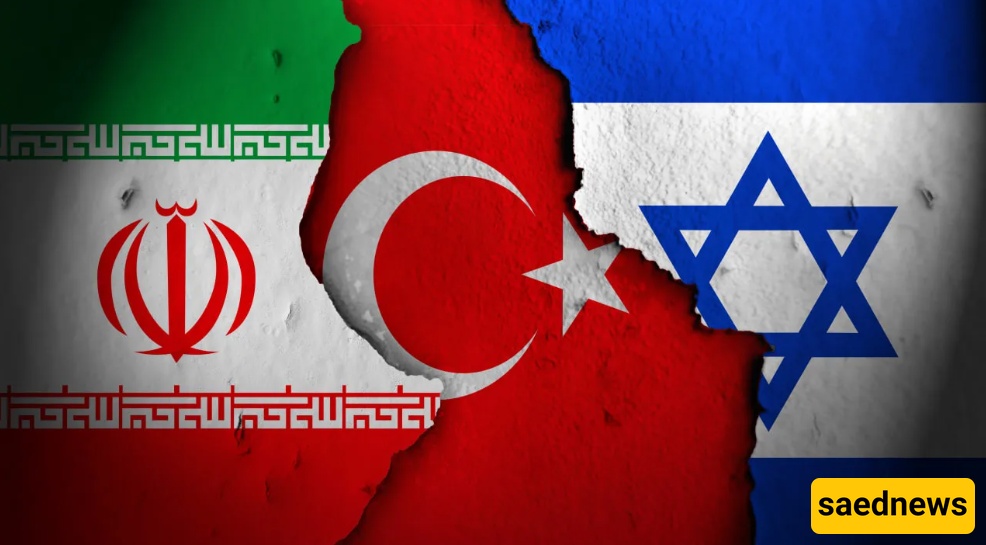SAEDNEWS: A 58-page Turkish intelligence report warns that the recent Iran-Israel war could lead to a broader regional conflict, emphasizing the growing role of cyber warfare and urging immediate diplomatic efforts regarding Tehran’s nuclear program.

According to TRT’s analytical coverage, quoting IRNA via Saed News, a top Turkish intelligence body has issued a stark warning that the recent confrontation between Iran and Israel remains a serious threat to broader regional stability. The report, titled “Warning from the Turkish Intelligence Academy: Iran-Israel Tensions Could Lead to Wider War,” stresses the urgent need for sustainable diplomatic initiatives with Tehran, particularly concerning its nuclear program.
The detailed 58-page report highlights that cyber warfare and digital manipulation of public opinion now form the core of modern conflicts, marking a dramatic shift from conventional warfare to complex, multi-dimensional battles.
The document underscores that “cyber, electronic, and cognitive wars — now central to 21st-century battlefields — are no longer independent domains but tightly integrated elements of unified operational planning.”
During the intense 12-day military confrontation between the long-time foes, Iran and Israel exchanged missile strikes targeting key cities and military installations in both countries. The conflict also drew in the United States, which bombed Iran’s nuclear facilities before stepping in to mediate a fragile ceasefire.
According to the report, Iran has spent years investing in ballistic and hypersonic missile programs to neutralize Israel’s air superiority. Despite its technological edge, Israel failed to intercept several of these missiles. Some caused heavy damage and casualties in various parts of Israel, especially in Tel Aviv and Haifa — revealing a setback in Israeli deterrence capabilities.
Iranian missiles struck multiple Israeli airbases, Ben Gurion Airport, power plants in Tel Aviv, oil refineries and port areas in Haifa, as well as key communication and transport hubs across central Israel.
The report highlights Israel’s targeted assassinations of senior Iranian military and intelligence commanders, as well as key nuclear scientists. It claims that these operations point to Israel’s deep human intelligence networks within Iran.
It alleges that Iran lost several high-ranking officials during the conflict, including Armed Forces Chief of Staff Mohammad Bagheri, IRGC Commander Hossein Salami, and several prominent nuclear scientists.
The report concludes that such operational access “demonstrates how modern intelligence structures can shape the outcome of a war.”
Iran’s attempt to block WhatsApp during the conflict is cited as another example of cyber and electronic warfare, aimed not just at military targets but at manipulating public opinion through propaganda.
The report recommends: “It is essential to regulate and control civilian technologies with potential military applications, and to develop and widely adopt domestic alternatives wherever possible. Specifically, government institutions and sensitive personnel should be mandated to use local software and hardware.”
The report also notes that despite internal pressures from Israel and parts of the Iranian diaspora to trigger a domestic uprising or regime change, public opinion within Iran largely prioritized stability and governmental order. Still, it warns that if diplomatic efforts collapse, regional chaos will be inevitable and a new, possibly even more severe war could erupt.
It urges Turkey to accelerate the integration of manned and unmanned aerial systems, invest in domestic missile defense and cyber capabilities, and strengthen protection of critical infrastructure and defense industry intelligence. The report also emphasizes the need for long-term planning, public resilience, and homegrown solutions, noting that future conflicts may feature AI-based weapons and swarms of advanced drones.
The Israel-Iran war began on June 13 when Israel launched large-scale airstrikes on Iranian military, nuclear, and civilian targets, killing at least 935 people. According to Iran’s Ministry of Health, 5,332 individuals were injured in these attacks.
In response, Tehran launched waves of missile and drone strikes that, according to data from the Hebrew University of Jerusalem, left at least 29 Israelis dead and over 3,400 injured. The conflict ended with the implementation of a ceasefire on June 24.

